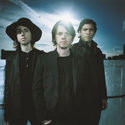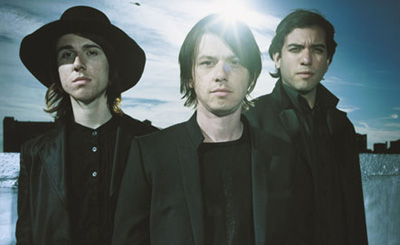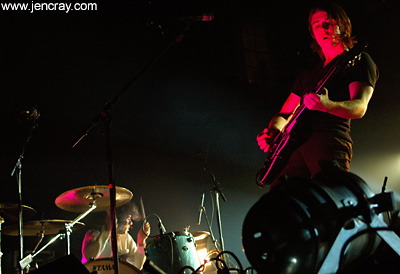
When the last believer has dropped dead:
An Interview with Josh Garza of The Secret Machines
Gail Worley
At a time in modern music when the goal of every commercial-appeal-seeking band is to sound exactly like fifteen other popular crappy bands and to look like a flock of unkempt emo dweebs, a girl like me naturally turns to her back-catalog of Led Zeppelin and Queen albums for sweet aural relief; bringing back memories of a time when men maybe styled themselves like women, but nevertheless acted like full-on sex gods. Good times, kids. Never let it be said that I don’t go out of my way to live in the past. But anywhere from, say, four to ten times a year, I hear a new album by a current band that keeps me from tossing every new promo CD I get into the garbage unheard. Last year, one of those faith-restoring albums happened to be the self-titled fourth disc by the NYC-based band, Secret Machines. Among the most original-sounding American rock-genre bands of the past ten years, Secret Machines remind me of a grunge version of Be-Bop Deluxe; incorporating psychedelia and art rock with pronounced garage rock sensibilities. But their secret weapon is perhaps drummer Josh Garza, who plays the kit like the reincarnation of John Bonham himself. Holy cow, what a great band.

A while back, I had a conversation with Josh Garza where I asked him why Secret Machines (which also includes bassist Brandon Curtis and guitarist Phil Karnats) rock so hard, and how come he’s such a fantastic drummer; you know, questions like that. Here’s what Josh told me… .
• •
I guess the long story is that I have three brothers that are all way older than me. I have twin brothers that are ten years older and another brother who is twelve years older than me. When they were in high school they loved music, and these guys are the ones that turned me on to rock. On Friday nights they’d listened to all their records from the ’60s and ’70s and they’d act like they were in a band. My twin brothers would play air guitar and my oldest brother would act like he was the singer. I was just the younger brother that would stick to them like glue and they wanted me to get out of the way, so they picked me up and put me on top of the bunk bed behind them. They said, ‘Act like you’re the drummer.’ That was the moment where I became the drummer. When your older brother – your hero – tells you that you’re the drummer well, guess what? You’re the drummer.
I just took it from there. The way that people who like to draw like to just noodle around, that’s how I looked at drums as a really young kid. Eventually, I got a pair of sticks and I just taught myself by listening to music. I remember there was this strange [sense of wonder], being really young and going, ‘How do they do this?’ Because I didn’t even know there was a foot pedal at the time. I was just like, ‘How the hell do they do this?’ Eventually I realized, ‘Ohhhh!’ I think the reason I have such a distinct style is that I wasn’t taught to do everything in a specific way. In fact, I do it the way anybody would just dance their own dance. I’m just not one to learn any specific way of doing things.
One of the best things that ever happened to me is when I moved to New York in 2000 and I worked at the Sam Ash drum shop for two years. I needed a job because I was broke as shit living in New York doing The Secret Machines. I really lucked out, because they needed somebody who could speak Spanish and I just happen to speak Spanish. Man, those guys working there were super talented guys that could fucking play circles around me all day. They would teach me a different way of doing stuff and I would take from them. There was one heavy metal guy and he taught me some stuff. There was a jazz guy who showed me some stuff. And that, actually, for me, was the best experience ever. Just being around drummers that were really good, I picked up a lot from them.
You know, I’ve talked to other guys that worked in drum shops and they told me pretty much the same thing, that working with guys that played different styles is a great way to grow, and also that surrounding yourself with players who are better than you can help you grow and improve.
I think that also gave me the confidence to just be me, because hearing a lot of stuff, I immediately knew that I didn’t dig it. Kind of like when somebody shows you a pair of pants, and you say, ‘yeah, I can tell those are nice, expensive pants, but I don’t like them.’ It was just a preference sometimes, where I took the things I needed. It really made me exaggerate who I was; like, ‘well this is what I’m good at,’ so I’d play up my strengths and, so what if you can’t do this or that? Sometimes you can get away with it or sometimes the music doesn’t require you do be that kind of player. Secret Machines doesn’t really require me to be Neil Peart. It allows me to be more of a free-style player and to lay it down the way I would like to. I’m into that.
I once interviewed Pat Wilson from Weezer and he’s a big Bonham fan. He told me this funny story about how every recording engineer will tell you how drummers come to them and say “I want this to sound like ‘When The Levee Breaks.’” So they set up the kit and the guy plays the part. Then they play it back and the drummer says ‘why doesn’t this sound like “When The Levee Breaks” and the engineer says, ‘Because you don’t play like John Bonham.’
[Josh laughs.] That’s funny.
Of course there’s a huge difference between saying you’re influenced by John Bonham and actually being able to channel the John Bonham sound, which you absolutely do. How do you do what every other rock drummer only dreams of doing? How much is technique, how much is the drums and the way they’re tuned, etc?
Well, obviously the sizes of my drums have a lot to do with it. But the advantage I have these days with the sound that I get is the fact that I have never succumbed to what the experts say you should do with kick drums. You know, ‘you’ve got to get the inside pillow and you’ve got to get this really thick drum head,’ and it’s like, man, I have a sound guy. He can turn up the low end but what he can’t do is give it the cannon effect. I read how Bonham got that because he tuned his stuff like a big band drummer. Big band drummers tuned their drums high so that drummers could hear them. They weren’t looking for low end; they had a bassist. We’re talking about years ago, when they had a different angle on music. The drummer wasn’t the low end, the drummer was the percussiveness – the beat – and then you had some bass and low end coming from other instruments.
That’s where I got the idea for the tunings on the big drums I have. I was like, ‘OK, I’ll act like I’m in a Big Band and I’ll tune them really high.’ Basically, it ends up that the batter side is high and tight and the resonant head is loose and full of juice. Plus there’s nothing in there, so it has this cannon effect. Then, with the sound engineer putting a mic there, I tell him, ‘Dial in the low end that you need’ – obviously, you won’t have as much as you want because it’s not a dead drum. I think that has a lot to do with it and a lot of cats aren’t really into that sound because… it’s like a Ginger Baker sound. A lot of people aren’t really into that these days. People like the kick to be really dead and dry. My thing has always been, like, if the kick drum were supposed to have a pillow in there they would have designed it that way.
Like, ‘What kind pillow would you like with your kick drum?’
Exactly, right! ‘What color would you like…?’ And that’s cool, I’m not dogging anybody that does that, but that’s how I got into the sound that I have. I do take from that era in rock where it was like the Keith Moon, Ginger Baker, Mitch Mitchell sound. It’s very percussive and it’s very like… you know, the drums don’t have a shit ton of body body. Nowadays, a guy goes around the horn and it’s like, Jesus Christ, man, with a lot of low end and it’s vibrating. You have to find that balance, and that’s what I was able to do. And also, I beat the shit out of them. It’s like having a hot rod; it only really runs well when you give it the gas. That’s one of my secret weapons; that you have to dig deep and find this cannon sound, and not be scared. I think that’s paid off for me because, yeah, for some people it’s easy to sound like Bonham because of ProTools and all of these plug-ins. You can really fake it, but when it comes to being in a band and rocking, you can’t fake that. There’s only so much a sound guy can do (laughs).
I love your sound and your approach is very exciting to me.
I think it’s kind of funny that it just happened inadvertently, too. I mean, I don’t have vintage drums, I don’t have vintage cymbals. I don’t really care about that stuff and I never really got into it. It’s cool when guys want to show me their ’60s Ludwig stuff – it’s cool, but is it you? Are you channeling yourself or are you trying to get into vintage gear for some other reason?
How long have you been actually playing drums?
Man, for a long time, let’s see… let me count the years. I’d say coming up on 21 years. I think I started really playing probably around ‘88. That’s when I finally convinced my uncle to co-sign on some drums. It was hilarious, because I think I was in high school and I had never played the drums, I had never done anything on drums, but I just knew I could play them. (Laughs) I told him that if he co-signed for the drums I would work for him as a busboy in his restaurant until I could pay him back. He was like, ‘That’s all fine and dandy but do you even know how to play drums?’ I was like, ‘No, but I can do it.’
Plus you were the drummer on the bed, in the air guitar band.
[Laughs] I convinced him, but he didn’t really give a shit [about me paying him back]. He owned the restaurant, he had money and I worked for him basically for free as a busboy for three months during the summer, and I had my drumset. That was late ‘87 or early ‘88. I started late, and I think that’s probably one of the reasons I lucked out. As you get older, you get to learn who you are as a person a little better. So as I started learning the drums in my later years in high school, and into college the drums came with me in terms of me growing as a person. My personality at that time was vastly different [than it would have been at a younger age] so the drums were able to change with me. I think in college, maybe around ‘90 or ‘91, it was fairly soon after I got into drums, that I got the 28-inch kick drum. That was directly linked to knowing that Bonham played a 28-inch and that it was a rare thing. I’d heard that a few guys that played 26s and I thought those were awesome, so I thought that the 28 should be even better.
I went to this store in Dallas and basically the first 28-inch I bought had belonged to the University of North Texas. It had been part of the marching band and it was too big of a marching drum for anybody to wear, so they had in on consignment at this drum shop. I bought this 28-inch kick drum and I think it was $250. It’s funny that I would do that, because it’s like getting a hot rod right out of the gate. I’m glad I never went for out-of-the-box stuff. I worked at a music store and I remember selling drum kits to kids; they all get the same sizes and the same kick drum and the same cymbal set ups – especially the starter sets. I’m glad I was able to break out of that mold fairly quickly, early in my drumming life, which is really weird, because I felt like I’ve been a drummer since I was six or seven years old, but I didn’t really start until high school. But fairly early on in that game I was able to start using different cymbal sizes and different tom sizes – and, obviously, a different kick drum size.
There was a ‘Eureka’ moment, you know? Where I realized, ‘Oh shit, that’s how Bonham got that sound!’ He had a big old bass drum and he just played it and turned it up. He played it the way Hendrix played his guitar. It was cool to get that early on and not have to try to go into the studio and fake it. And, OK this doesn’t sound exactly like Bonham, it sounds like Josh Garza, but it’s from that same school of saying ‘let’s turn it up and not be scared.’
When you guys are recording do you use any special micing or recording techniques to get those drum sounds?
Not really. On this record and the previous record we worked with the same engineer. On the new record he pretty much was there the whole way; from demo-ing the songs to rehearsals to tracking and mixing the record. Even all the way to the mastering, we had the same guy. The trick, I think, was that I put him in front of my drums – actually, I had him stand right behind me. Then I played the drums and I go, ‘Look, right now, don’t be a producer. Don’t give me your two cents. Be a scientist. You hear that? Put that on tape!’ and he was like, ‘OK, I get it.’ I think that was the essence of the sound we got on the record.
The real trick was to work on the sound first; to work on the mics and … you know, basically try to move the mic an inch this way or that way, pulling it back or pushing it forward until it sounds on tape very close to what it sounds like to be in that room with me [playing]. That’s a real difficult thing, because most people want to go, ‘Set up, record and bam!’ But we spent basically all day working on guitar, bass, and drums. All day. And we would take a break, eat dinner, get high and chill out. Then from 8 or 9 PM until about 1:00 AM we’d just play the song over and over, maybe take a break and do eight or nine takes.
The one thing that a lot of people don’t know, and don’t give a shit about these days, is that on our record, those are live takes with a band. The bass, drums and guitar are live takes. Obviously we did overdubs, but we did overdubs on live band takes. That’s missing from recordings you hear today. I said this in another interview; it’s kind of like what’s happened to the field of photography. Everybody’s a photographer now because it’s so easy and because of Photoshop. But that takes away from the actual art of photography; you know, the guy who actually uses film and develops it in a dark room. But now, who cares if you did that in a dark room? One guy did it at home on his computer and it looks the same. I don’t expect anyone to give me a medallion that says ‘I’m Old School,’ but to us, we feel very good saying it’s an honest record. Warts and all – that’s us. It wasn’t mixed in a way to help us sound like that. We obviously let it breathe. I like that.
And like I said, a lot of people these days don’t give a shit about that, so this might just be for those few people who actually understand, or if anything it’s just for us as a band to know that when we show up in town to play, trust me, we’re going to fucking rock. I’ve heard a lot of bands that sound good on tape, on record, and then I go see them and it’s like it was all smoke and mirrors. You guys aren’t rocking as much as I thought you were.
And the singer doesn’t really know the words to the songs…
Yeah! Just a lot of stuff like that. Like I said, I’m Old School, I guess, but that’s why we’re so proud of our live shows. It’s OK if you don’t like it – but you know what? It still rocks. And a lot of people don’t dig us. It’s like reading a review of Black Sabbath that says they sucked; you’ve got to at least put a foot note saying, ‘yeah, but they rocked.’ You can totally hate Sabbath but you know, [laughs] you can’t deny the fact that they rock. That’s what I want to be a part of. I think it’s just a different day and age these days. Any kid with a computer can… make a record.

Secret Machines definitely have a unique sound in today’s marketplace. My first impression of this new CD when I heard it was that I thought of a grunge version of Be Bop Deluxe.
I’ve heard of Be Bop Deluxe but I never really listened to them. It’s kind of a weird challenge; to avoid putting too many of your influences on your sleeve. But one thing about The Beatles that we always forget is that that was what made them great. Listen to the song “Revolution”; as a music lover, I love that song as a Beatles song, but also it reminds me of ’50s rock. For them, the ’50s artists were their influences and the songs they jammed on. They were able to take what they dug and make it their own. That’s what we’re trying to do. We might sound like this or that band… but at the same time it’s really weird to be in a band that’s totally [taking things] from Brian Eno’s rock records and Harmonia and obscure German bands. If you call us out on that, first of all, it’s cool that you even recognized those influences (laughs). I’m more impressed that you knew where we got that, but we try to be careful. What we want is for people to dig what Secret Machines is doing to where they’re not going to go, ‘Well, I would rather listen to the bands that they took from.’
That’s what bugs me sometimes about lot of bands that sound like other bands. I’ll just listen to the Beach Boys’ Pet Sounds if that’s what I want to hear. We try to do our own thing, because we know the hardcore people don’t have time for bullshit, but it’s really weird to be doing that in a day and age where it’s not necessary. A lot of people just don’t give a shit. I mean, there are some bands these days from New York that get hyped-up that I don’t get what everyone is all excited about. OK, it’s cool, but it doesn’t spank me. I’m one of those guys that need to be spanked, I need to be rocked. I need something to make me go, ‘hey man this is fucking rocking!’ A lot of things don’t do it.
Especially now, when there are maybe five different “sounds” that are commercially marketable, and you’ve got 50,000 bands trying to grab and fit into one of those five sounds. Yawn city.
Yeah! I know what you mean. It’s hard, because you can’t deny if somebody has the talent, but to have personality that exists in the sound that you have and then also in the music you play. Well, that’s why people love Keith Moon, Mitch Mitchell and John Bonham. Those guys inspired me the way, I think, Dylan inspired Hendrix. It was like, ‘don’t be like me, be you. Do what you do, and turn that up.’ Everybody can say that they love this or they love that, but I feel like I was compelled to wear my own thing, to have my own freak flag and say, ‘This is what I do.’ It’s so distinct that you can’t even hold a candle to it. But I’m also doing it in a day and age where it doesn’t matter. You just said yourself, it’s got to be “indie” or it’s got to be “nu-metal” or… I’m just like, man you’ve got to be kidding me. You’ve decided to sound like every other band. Wow.
Being popular at all has been a hard thing for me to come to terms with, because I’ve noticed that a lot of the people love us and really dig us – I mean they come out of the woodwork, it’s really kind of funny. But the people that really hate us have bigger bullhorns. You know what I mean?
Like the Conservative Right.
Right! Exactly! You know, the first review of the show we just did, the show at Webster Hall – on our own website – this guy completely panned it. He was like, ‘It sucked! There was no personality…’
Are you kidding me? That’s crazy.
I’m with you! I was like, ‘Man, KISS MY ASS! Are you kidding me?’ You know what I think it is? It’s like that classic thing where you either love us or hate us – there is no middle ground. And I dig that, but I’m getting kind of peeved that the people who do dig it just assume everybody digs it. I think it’s because a lot of our fans are a bit underground, it seems. I would hope that they would get a bigger bullhorn because, man I’ve read some reviews of our record and it’s like, wow. You should read the All Music Guide review of the new record [written by Tim Sendra]. He basically hates it. It was really weird that it was so mean-spirited. You know what I mean? It’s not that bad of a record.
I can see where you guys would not be everyone’s taste but there’s no need to be ridiculous.
Like I was saying earlier, I think it’s related to the reliance on the Flavor of the Week and what’s in and what’s not. Also, that said, a lot of people just don’t care. If you really think about it, it’s been the story of Rock & Roll. Not that we’re anywhere near Dylan, but for us Dylan is a big inspiration. Dylan in 1966 getting booed on that bootleg, it’s like, wow, you’re booing Dylan. So, now I don’t feel so bad; it’s like, ‘You better boo me. If you’re going to boo Dylan you better fucking hate me!’ It’s just so typical. When it comes to Rock & Roll you look at us like Neanderthals with crayons and it’s like you can just say anything and it’s correct or it’s true. If you don’t like rock, that’s totally cool. But don’t say we suck because you don’t like rock. When I read [that review in All Music] I thought I must have slept with [the writers’] girlfriend. I’m not kidding, it was that kind of review, where it’s like, ‘OK, who fucked this guy’s girlfriend?’ Then I thought to myself, ‘Well if I didn’t, I am now!’ (laughs).
So, spread the word because we’re one of those bands. They’re not going to give it to us, but the worst thing for them is that we’ll be that band that keeps making records! [Laughs] Like, ‘If you didn’t like this one, wait until the next one is out!’
‘We’re going to keep making records just to piss you off!’
Hell yeah!
The Secret Machines: http://www.thesecretmachines.com/ ◼












